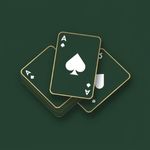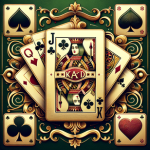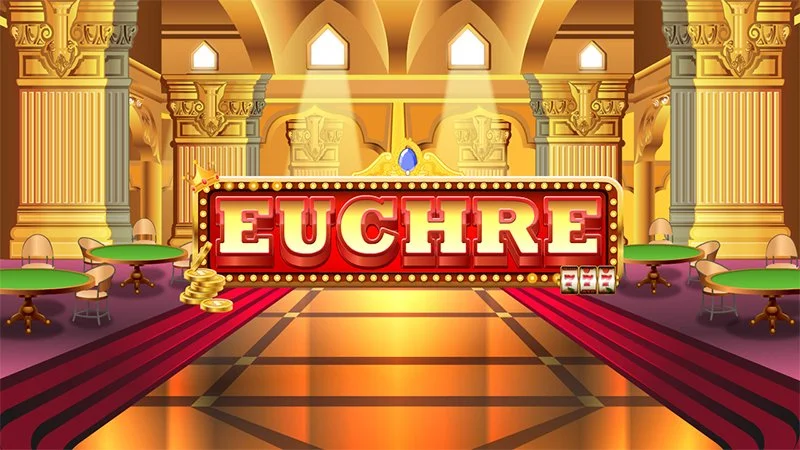Euchre

GAME INFO
Euchre is a timeless and highly engaging trick-taking card game that has been enjoyed by players for generations. Known for its fast-paced gameplay, strategic depth, and social interaction, Euchre is a favorite among card game enthusiasts and casual players alike. Played with a unique deck of cards and a focus on teamwork, the game challenges players to outwit their opponents, make bold calls, and win tricks to score points.
Whether you’re playing with friends at a gathering, competing in a tournament, or enjoying a digital version online, Euchre offers a fun and competitive experience that keeps players coming back for more. Its combination of strategy, luck, and teamwork makes it a must-play for anyone who loves card games.
The Premise of Euchre
The premise of Euchre is simple yet captivating: players compete in teams of two to win tricks and score points. The game is played with a specialized deck of 24 cards, consisting of the 9, 10, Jack, Queen, King, and Ace of each suit. The objective is to be the first team to reach a predetermined score, typically 10 points, by successfully bidding and winning tricks.
What sets Euchre apart from other trick-taking games is its unique mechanics, such as the concept of the "trump suit" and the special role of the "bowers" (the Jack of the trump suit and the Jack of the same color suit). These elements add layers of strategy and excitement to the gameplay, as players must carefully plan their moves, communicate with their partner, and adapt to the ever-changing dynamics of the game.
The game’s social and competitive nature makes it perfect for gatherings, as it encourages teamwork, friendly banter, and strategic thinking.
Gameplay Mechanics
Euchre combines simple rules with strategic depth, making it easy to learn but challenging to master. Here’s a breakdown of the core gameplay mechanics:
-
The Deck and Setup Euchre is played with a 24-card deck, consisting of the 9, 10, Jack, Queen, King, and Ace of each suit. The game is typically played by four players, divided into two teams of two. Teammates sit opposite each other at the table.
At the start of the game, the dealer shuffles the deck and deals five cards to each player, leaving four cards in the center of the table. The top card of the remaining deck is turned face-up to determine the potential trump suit.
-
The Trump Suit and Bidding The trump suit is a key element of Euchre and determines which cards are the most powerful during the round. The bidding phase begins with the player to the left of the dealer, who has the option to "accept" the face-up card as the trump suit or "pass." If a player accepts the trump suit, they become the "maker" and their team must win at least three of the five tricks to score points.
If all players pass, the face-up card is removed, and players have the opportunity to choose a different suit as the trump. This phase requires careful consideration, as selecting the trump suit can significantly impact the outcome of the round.
-
The Role of the Bowers In Euchre, the Jack of the trump suit is known as the "right bower" and is the most powerful card in the game. The Jack of the same color suit (e.g., if Hearts is trump, the Jack of Diamonds) is the "left bower" and is the second most powerful card. These cards outrank all other cards in the trump suit, making them critical to winning tricks.
-
Playing Tricks Once the trump suit is determined, the gameplay begins. The player to the left of the dealer leads the first trick by playing a card from their hand. Each subsequent player must follow suit if possible. If a player cannot follow suit, they may play a card from a different suit, including a trump card.
The highest-ranking card in the suit led wins the trick, unless a trump card is played, in which case the highest-ranking trump card wins. The winner of the trick leads the next one, and play continues until all five tricks have been played.
-
Scoring At the end of the round, points are awarded based on the number of tricks won by the maker’s team:
- If the maker’s team wins 3 or 4 tricks, they score 1 point.
- If the maker’s team wins all 5 tricks, they score 2 points.
- If the maker’s team fails to win at least 3 tricks, the opposing team scores 2 points (this is called being "euchred").
The first team to reach the predetermined score, typically 10 points, wins the game.
-
Going Alone A player who believes they have an exceptionally strong hand may choose to "go alone," playing the round without their partner. If the solo player wins all 5 tricks, their team scores 4 points. However, if they fail to win all 5 tricks, the opposing team scores points as usual. This high-risk, high-reward option adds an extra layer of excitement and strategy to the game.
Strategy and Teamwork
While Euchre involves an element of luck due to the random distribution of cards, strategic thinking and teamwork are essential to success. Key strategies include:
- Bidding Wisely: Deciding whether to accept the trump suit or pass is a critical decision that can determine the outcome of the round. Players must evaluate their hand carefully and consider the potential strength of their partner’s hand.
- Communicating with Your Partner: Although direct communication is not allowed, players can use subtle signals and strategic plays to convey information to their partner. For example, leading with a specific card can indicate the strength of a particular suit.
- Managing the Trump Suit: Knowing when to play trump cards and when to save them for later tricks is a key aspect of Euchre strategy. Players must anticipate their opponents’ moves and plan accordingly.
- Counting Cards: Keeping track of which cards have been played can give players a significant advantage, as it allows them to predict the remaining cards in play and make more informed decisions.
Variations and House Rules
One of the reasons Euchre is so popular is its flexibility and adaptability. Players can customize the game with house rules and variations to suit their preferences. Some common variations include:
- Stick the Dealer: If all players pass during the bidding phase, the dealer is required to choose a trump suit.
- No Trump: In some variations, players can choose to play a round without a trump suit, adding an extra layer of challenge.
- Progressive Euchre: In this variation, players rotate partners after each game, making it a great option for larger groups.
These variations add variety and replayability to the game, ensuring that no two sessions are ever the same.
A Social and Competitive Experience
One of the standout features of Euchre is its social and competitive nature. The game encourages interaction, teamwork, and friendly competition, making it a perfect choice for gatherings with friends and family. Whether you’re strategizing with your partner, bluffing your opponents, or celebrating a well-played hand, Euchre is a game that brings people together.
Why Euchre Stands Out
Euchre is more than just a card game—it’s a test of strategy, teamwork, and quick thinking. Its combination of simple rules, dynamic gameplay, and social interaction makes it a timeless classic that appeals to players of all ages and skill levels.
The game’s emphasis on strategy and communication sets it apart from other trick-taking games, offering a unique and rewarding experience that keeps players engaged and entertained.
Conclusion
Euchre is a game that combines the excitement of trick-taking with the challenge of strategic decision-making and teamwork. With its fast-paced gameplay, unique mechanics, and social appeal, it’s no wonder that Euchre has remained a favorite among card game enthusiasts for generations.
So gather your friends, shuffle the deck, and get ready to test your skills in Euchre. Will you outwit your opponents, win the tricks, and claim victory? The cards are in your hands!












